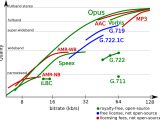Mozilla learned fast from its defeat, when it was force to finally support h.264 for HTML5 video, albeit in a roundabout fashion, and this time around it built a codec itself (mostly) and had it made standard so fast, Microsoft didn't see it coming.
Opus is a new audio codec that's recently been "finalized" and has now been ratified as standard by the Internet Engineering Task Force (IETF).
Opus, unlike many of its competitors and predecessors, is a completely open source and patent-free codec, meaning it can be used by anyone, in any app, without having to pay anyone or worry about lawsuits. There's no need to explain why that is a big deal.
"There was both skepticism and outright opposition to this work when it was first proposed in the IETF over 3 years ago," Mozilla's Jean-Marc Valin, one of Opus' authors, wrote.
"However, the results have shown that we can create a better codec through collaboration, rather than competition between patented technologies," he said.
"Open standards benefit both open source organizations and proprietary companies, and we have been successful working together to create one," he added.
“Opus is the result of a collaboration between many organizations, including the IETF, Mozilla, Microsoft (through Skype), Xiph.Org, Octasic, Broadcom, and Google," he explained.
Opus is already the clear favorite to become the mandatory default in WebRTC, which stands for web real-time communications, i.e. audio and video calls. With it now being ratified as standard, its position is mostly assured.
WebRTC is one of the biggest web technologies of the moment and it has the potential to greatly expand just what can be done with a web app.
With support from Mozilla, Google and Opera, it has virtually guaranteed success, but in the unfortunately still very political world of web standards, there are no guarantees.
Still, Mozilla has announced that it plans to build full support for WebRTC in Firefox 18, which lands in January next year. Chrome and Opera are also getting support.
Opus will handle the audio part of the real-time communications. The codec is quite versatile, it's designed for VoIP in particular, so it works with very low bandwidths, all the way down to 6 kbps, with a narrowband of 8kHz, more than enough for voice, and in mono.
But it scales well too, it scales better than any other audio codec in fact. That's because it's actually based on two different codecs that are used depending on the situation. One handles lower bandwidth and voice in particular, the other is used when the network conditions allow it.
But Opus goes all the way up to 512 kbps, more than enough for any type of lossy audio codec. MP3 for example stop at 320 kbps. It also supports a fullband of 48kHz, more than enough for music and more than a standard CD.

 14 DAY TRIAL //
14 DAY TRIAL // 
